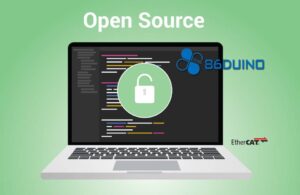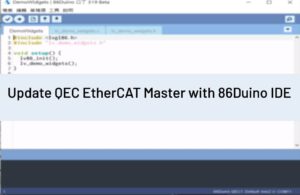[Modbus]
Modbus86 Slave enables the 86Duino to emulate a Modbus Slave node, receive commands and execute callback functions on the channel.
Example
Example of a Slave device with RS485 enabled and using Modbus RTU as the communication method.
#include <Modbus86.h>
ModbusSlave bus;
ModbusSlaveNode node;
uint32_t command = 0;
uint32_t lasttime = 0;
uint8_t read_holding_registers( uint8_t function,
uint16_t address,
uint16_t length)
{
for (int i = address; i < address + length; i++) {
if (i == 16)
node.writeHoldingRegister(i, command & 0xFFFF);
else if (i == 17)
node.writeHoldingRegister(i, (command >> 16) & 0xFFFF);
}
return MODBUS_SUCCESS;
}
uint8_t read_input_registers( uint8_t function,
uint16_t address,
uint16_t length)
{
int sensorPin = A2;
if (address <= 2 && address + length > 2)
node.writeInputRegister(2, analogRead(sensorPin));
return MODBUS_SUCCESS;
}
uint8_t write_multiple_registers( uint8_t function,
uint16_t address,
uint16_t length)
{
int i;
for (i = address; i < address + length; i++) {
if (i == 16)
command = (command & 0xFFFF0000) | node.readHoldingRegister(i);
else if (i == 17)
command =
(command & 0x0000FFFF) | (node.readHoldingRegister(i) << 16);
}
return MODBUS_SUCCESS;
}
uint8_t write_single_coil( uint8_t function,
uint16_t address,
uint16_t length)
{
uint16_t value;
if (address == 0) {
node.readCoil(address, 1, &value);
if (value)
digitalWrite(LED_BUILTIN, HIGH);
else
digitalWrite(LED_BUILTIN, LOW);
}
return MODBUS_SUCCESS;
}
void setup()
{
pinMode(LED_BUILTIN, OUTPUT);
Serial485.begin(115200);
/* Modbus RTU Mode via RS485. */
bus.begin(MODBUS_RTU, Serial485);
/* Slave node with ID 11. */
node.attach(11, bus);
/* Set the callback function of Read Holding Registers (0x03). */
node.cbFunc[MODBUS_CB_READ_HOLDING_REGISTERS]
= read_holding_registers;
/* Set the callback function of Read Input Registers (0x04). */
node.cbFunc[MODBUS_CB_READ_INPUT_REGISTERS]
= read_input_registers;
/* Set the callback function of Write Single Coil (0x05). */
node.cbFunc[MODBUS_CB_WRITE_SINGLE_COIL]
= write_single_coil;
/* Set the callback function of Write Multiple Registers (0x10). */
node.cbFunc[MODBUS_CB_WRITE_MULTIPLE_REGISTERS]
= write_multiple_registers;
}
void loop()
{
uint32_t now;
node.poll();
now = millis();
if (now - lasttime > 500) {
lasttime = now;
Serial.print("commnad = ");
Serial.println(command);
}
}Example of a Slave device with Ethernet-enabled and using Modbus TCP as the communication method.
#include <Ethernet.h>
#include <Modbus86.h>
ModbusSlave bus;
ModbusSlaveNode node;
byte mac[] = {0x00, 0x00, 0x00, 0x00, 0x00, 0x00};
IPAddress localIp(192,168,1,102);
uint32_t command = 0;
uint32_t lasttime = 0;
uint8_t read_holding_registers( uint8_t function,
uint16_t address,
uint16_t length)
{
for (int i = address; i < address + length; i++) {
if (i == 16)
node.writeHoldingRegister(i, command & 0xFFFF);
else if (i == 17)
node.writeHoldingRegister(i, (command >> 16) & 0xFFFF);
}
return MODBUS_SUCCESS;
}
uint8_t read_input_registers( uint8_t function,
uint16_t address,
uint16_t length)
{
int sensorPin = A2;
if (address <= 2 && address + length > 2)
node.writeInputRegister(2, analogRead(sensorPin));
return MODBUS_SUCCESS;
}
uint8_t write_multiple_registers( uint8_t function,
uint16_t address,
uint16_t length)
{
int i;
for (i = address; i < address + length; i++) {
if (i == 16)
command = (command & 0xFFFF0000) | node.readHoldingRegister(i);
else if (i == 17)
command =
(command & 0x0000FFFF) | (node.readHoldingRegister(i) << 16);
}
return MODBUS_SUCCESS;
}
uint8_t write_single_coil( uint8_t function,
uint16_t address,
uint16_t length)
{
uint16_t value;
if (address == 0) {
node.readCoil(address, 1, &value);
if (value)
digitalWrite(LED_BUILTIN, HIGH);
else
digitalWrite(LED_BUILTIN, LOW);
}
return MODBUS_SUCCESS;
}
void setup()
{
pinMode(LED_BUILTIN, OUTPUT);
Ethernet.begin(mac, localIp);
/* Modbus TCP Mode via Ethernet. */
bus.begin(MODBUS_TCP);
/* Slave node initialize. */
node.attach(11, bus);
/* Set the callback function of Read Holding Registers (0x03). */
node.cbFunc[MODBUS_CB_READ_HOLDING_REGISTERS]
= read_holding_registers;
/* Set the callback function of Read Input Registers (0x04). */
node.cbFunc[MODBUS_CB_READ_INPUT_REGISTERS]
= read_input_registers;
/* Set the callback function of Write Single Coil (0x05). */
node.cbFunc[MODBUS_CB_WRITE_SINGLE_COIL]
= write_single_coil;
/* Set the callback function of Write Multiple Registers (0x10). */
node.cbFunc[MODBUS_CB_WRITE_MULTIPLE_REGISTERS]
= write_multiple_registers;
}
void loop()
{
uint32_t now;
node.poll();
now = millis();
if (now - lasttime > 500) {
lasttime = now;
Serial.print("commnad = ");
Serial.println(command);
}
}Libraries Reference Home
The text of the 86Duino reference is a modification of the Arduino reference and is licensed under a Creative Commons Attribution-ShareAlike 3.0 License. Code samples in the reference are released into the public domain.



